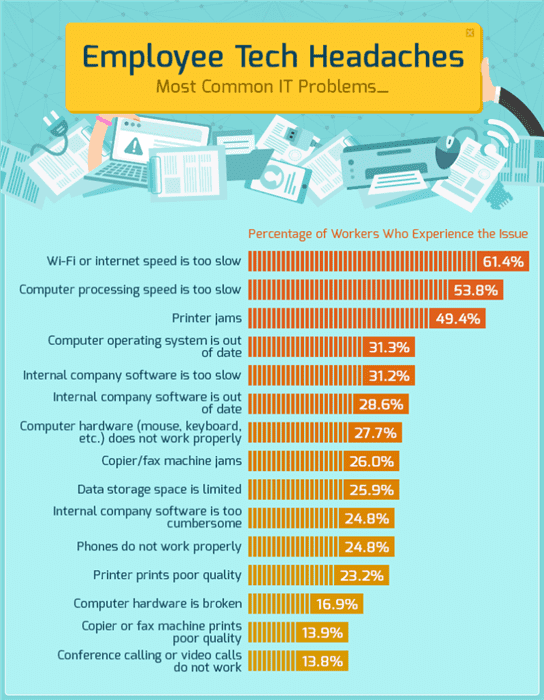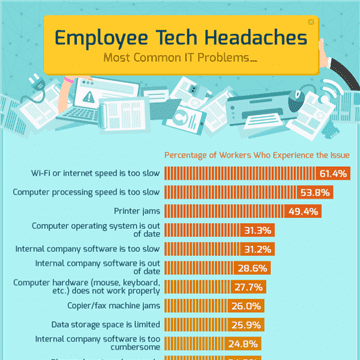The excruciating days of dial-up may be long gone, but employees are still less than happy with the speed of their internet connection.
A new survey by MonsterCloud found that of the 2,000 office employees it consulted, over 60 percent cite slow wi-fi or internet connection speeds as their top IT pet peeve.
Next on the list of the most irksome technical issues in the workplace were slow computer processing, cited by more than 54 percent of respondents, followed by printer jams (49.4 percent of employees), out of date computer processing systems (31.3 percent), and slow internal software (28.6 percent). Employees also complained of dysfunctional computer hardware including mouses and keyboards, along with copier and fax jams, and limited data storage.
Even Tech Companies Have Slow Wi-Fi
Perhaps the most surprising takeaway of the survey is that every type of company consulted groused about slow wi-fi — even those employed by fancy young tech startups.
“Everyone’s top complaint in every type of office was slow wi-fi,” said Jamie Linn, project manager for MonsterCloud.
In an overwhelmingly digital age, where so much of our workflow depends on connectivity, the question must be asked: Why the heck are we still dealing with slow wi-fi?
An abundance of factors come into play — where you’re located, how many computers are connected, the type of files you’re sending and downloading, to name a few — but much of the time it comes down to the sheer amount of stuff we’re all doing and consuming on the internet at any given time.


Bandwidth Overload
“Employees are also using a lot of data at work: Many of us connect multiple devices directly to the corporate network,” said IT executive Matt Belanger.
In most cases, corporate networks aren’t set up or budgeted for such excessive data usage, unlike our home tablets and smartphones.
“If all your devices are synchronizing all your apps, then you’ve added a lot of traffic even though you’re not actively watching all your screens,” said Belanger. “Think of that email that goes to your laptop, phone, and tablet. Now add in Facebook and other social media, app updates, etc. Most employers can actually see a significant traffic spike when Apple releases a new version of iOS.”
To some extent we’ve become spoiled by the capabilities we have with our home bandwidth, which Belanger adds has grown in recent years.
“We’ve become used to a small household sharing a comparatively large pipe,” Belanger remarked. “The relation is inverted at work, where many users share a comparatively small pipe. We’re also not running the industrial-strength data inspection and scanning on our home internet connections, so there are fewer hops between the user and their content.”
Related: Your Inflight Wi-Fi Is About to Get Faster, Better, Cheaper
So, why can’t our companies simply bump up their corporate network’s bandwidth capabilities? Well, that costs time and money.
“With limited IT budgets to spread across all the services they deliver, businesses find themselves prioritizing tradeoffs, and internet speeds are often ‘satisfactory,'” said Belanger. “Adding incremental capacity to accommodate short-term peaks can be costly.”
Clinging to Printers in Digital Times
Another top pet peeve the study found revolved around printer jams, which is hardly a new problem. After all, printers have always been among the most frustrating devices whether in-office or at home. They jam up, lose wi-fi signals, and regularly need their ink cartridges replaced. And how many times a year might a repair person need to come in to the workplace and fix the printer?
With digital scanning/signing technologies emerging, it feels like high time to give abandon printers in the workplace, but alas like this faulty hardware still serves important purposes.
“Scanners work great, but still the requirement for paper [and printers] remains,” said Trevor Textor, rural IT and connectivity consultant.
However old-fashioned fax machines may seem (another popular nuisance), many businesses such as banks, governmental, and legal institutions still use them regularly, because, Textor says, they’re more secure than sending something via email.
Related: How to Protect Yourself Against ‘Free Wi-Fi’ Scams
As for the much-maligned printer — converting to fully digital systems requires time, money, and employee training. It’s not a cheap or simple fix, but over time, we’ll likely see more companies ditching printers and switching fully to digital — a move that could actually create more tech jobs.
“Increasingly, everything is becoming technology based; whether you’re a startup or an established company,” MonsterCloud’s Linn told NBC News. “I think we’ll see less [of the] analog technologies, which will produce [a demand] for more experts to fix that technology.”
Yes, even in a beautiful future world without printers, we’re still going to run into issues in the office that interrupt our work and require tech assistance.







